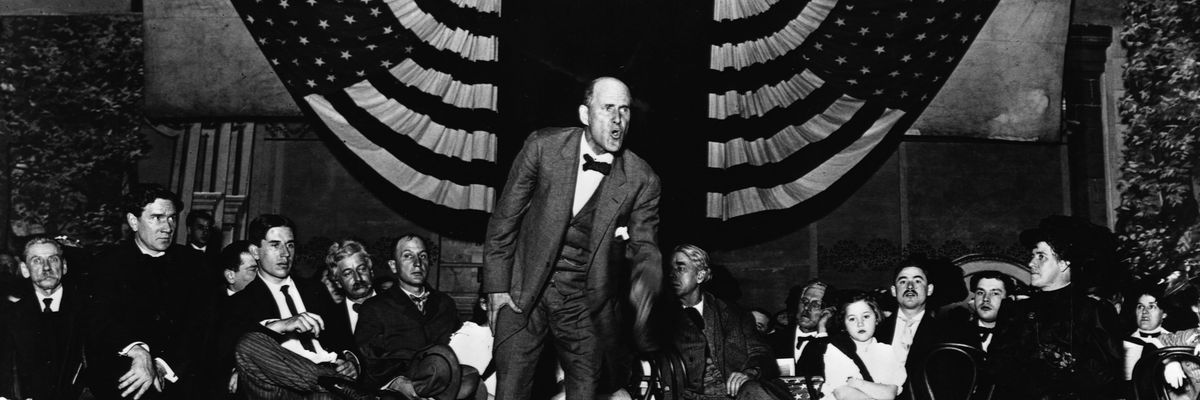On November 22, 1895, Eugene V. Debs was released from Woodstock Jail, where he had been imprisoned for six months for his leadership of the 1894 Pullman strike. Later that day, before a large crowd of supporters at Battery D in Chicago, he spoke on the topic of “Liberty.”
Debs was a great orator, and “Liberty” is a brilliant speech, powerfully evoking both “the spirit of liberty” heralded by the Declaration of Independence, and the promise of a freedom yet to be redeemed by American workers in thrall to plutocratic government. As Nick Salvatore noted in his classic biography, Eugene V. Debs, Citizen and Socialist, this speech marked an important moment in the evolution of Debs from a radically republican labor activist to the country’s leading socialist.
Debs notes his own situation, “stripped of my constitutional rights as a freeman and shorn of the most sacred prerogatives of American citizenship.” He proceeds to defend the American Railway Union as a necessary and legitimate organization of workers, and the strike as a legitimate means of pursuing justice, which” threw down no gauntlet to courts or armies—it simply resisted the invasion of the rights of workingmen by corporations.”
An adamant defense of worker rights, the speech’s overriding theme is unmistakably the political theme of “liberty” and indeed democracy. This is clear from Debs’s opening words:
Manifestly the spirit of ’76 still survives. The fires of liberty and noble aspirations are not yet extinguished. I greet you tonight as lovers of liberty and as despisers of despotism. I comprehend the significance of this demonstration and appreciate the honor that makes it possible for me to be your guest on such an occasion. The vindication and glorification of American principles of government, as proclaimed to the world in the Declaration of Independence, is the high purpose of this convocation.
The entire first half of the speech centers on the theme of “personal liberty; or giving it its full height, depth, and breadth, American liberty, something that Americans have been accustomed to eulogize since the foundation of the Republic.” Paying tribute to the republic’s founding—"For the first time in the records of all the ages, the inalienable rights of man, ‘life, liberty and the pursuit of happiness,’ were proclaimed July 4, 1776”—Debs proceeds to wax poetically, for eight long paragraphs, about the enduring resonance of that 1776 proclamation, the indivisibility of liberty, and the “more than satanic crime of stealing the jewel of liberty from the crown of manhood and reducing the victim of the burglary to slavery or to prison.” It is for this crime that he morally indicts the railroad magnates and their federal government allies for breaking the strike and imprisoning its leaders.
Debs insists that it is the labor movement that most embodies “the spirit of ’76”:
To the unified hosts of American working men fate has committed the charge of rescuing American liberties from the grasp of the vandal horde that have placed them in peril, by seizing the ballot and wielding it to regain the priceless heritage and to preserve and transmit it without scar or blemish to the generations yet to come.
The ballot, Debs notes approvingly, “has been called a weapon that executes a free man’s will as lighting does the will of God.” Debs rhapsodizes in almost religious tones about the power of democratic elections:
There is nothing in our government it cannot remove or amend. It can make and unmake presidents and congresses and courts. It can abolish unjust laws and consign to eternal odium and oblivion unjust judges, strip from them their robes and gowns and send them forth unclean as lepers to bear the burden of merited obloquy as Cain with the mark of a murderer. It can sweep away trusts, syndicates, corporations, monopolies, and every other abnormal development of the money power designed to abridge the liberties of workingmen and enslave them by the degradation incident to poverty and enforced idleness, as cyclones scatter the leaves of the forest. The ballot can do all this and more. It can give our civilization its crowning glory—the cooperative commonwealth.
Debs appreciated the rhetorical and the inspirational power of the dissenting American political tradition that hearkened back to the Revolution and its “spirit of ’76,” a tradition that included his heroes Jefferson, Paine, Garrison, Phillips, Lincoln, and Anthony. And he firmly believed that civil liberties and regular democratic elections represented forms of genuine if precarious social progress whose defense and expansion offered real opportunities for the furtherance of social and economic justice. He was, in short, a democrat.
He ended his speech with the hope that “American lovers of liberty are setting in operation forces to rescue their constitutional liberties from the grasp of monopoly and its mercenary hirelings.” That hope was not in vain, even if the Pullman strike was suppressed and Debs twice found himself in prison for refusing to be silenced, in 1895 and then in 1918 when imprisoned for his famous “Canton address,” critiquing WWI. The labor movement he helped to lead played a crucial role in advancing many of the policies—from the 8-hour workday to occupational safety and health regulation to “social security” broadly understood—that most Americans today simply take for granted. Debs was indeed one of the 20th century’s true crusaders for civil liberties and democratic inclusion. And his distinctive vision of a democratic socialism established an enduring legacy whose most recent heir is New York City’s mayor-elect, Zohran Mamdani, who indeed quoted Debs in his victory speech.
At a time when the
Trump administration is attacking liberty on a daily basis,
targeting everyone on the left as a “radical lunatic” and “enemy from within,” and seeking to destroy the very possibility of political dissent and opposition, Debs’s paean to “Liberty” on November 22, 1895—and his commitment to its active promotion—has never been more relevant.




